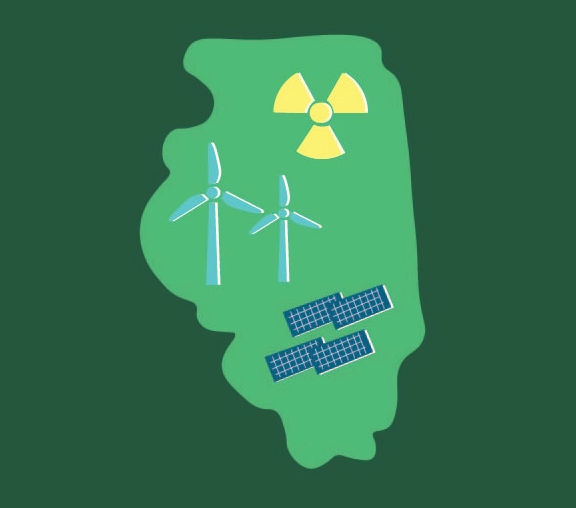Community considers green energy bill strong start
October 6, 2021
On Sept. 15, Illinois became a leader in the United States in the push for green energy, as governor J.B. Pritzker signed into law a bill meant to reduce the effects of climate change by eliminating carbon emissions and increasing funding to nuclear power plants.
Lab students and teachers had mixed reactions to the law, viewing it as a good start but not enough by itself to stop the effects of climate change.
The bill was proposed after Exelon, an energy company with multiple nuclear power plants in Illinois, threatened to close some of its plants in Illinois.
The law lays out a timeline which requires municipal coal and natural gas power plants to be carbon-free by 2045 and commits to 100% clean energy by 2050.
According to science teacher Sharon Housinger, timelines like these in energy regulations are crucial.
“If you just tell people, ‘Oh, you should be carbon neutral,’ there’s no financial incentive for a company to do it,” Ms. Housinger said. “So you give them a timeline. Otherwise, they’ll keep saying, ‘Oh, we’ll put it off until it’s more affordable.’”
Ms. Housinger said the effectiveness of Illinois’ regulations depends on the measures taken by other states.
“One issue is if only Illinois does it, and let’s say the cost of some item is higher because, in Illinois, they have these measures, but, like, Indiana doesn’t do it, then Illinois loses business,” Ms. Housinger said. “That’s why we want a national standard.”
While a common opposition argument of the bill is the potential increase in electrical bills, Ms. Housinger said a bigger issue is the potential for social and economic issues if the region does not address climate change effectively.
“People from other places that don’t have a good water supply are going to be moving towards the Great Lakes, and so we’re going to have an increased population with less food, and that’s going to cause huge economic disparity and a lot more social problems,” Ms. Housinger said.
According to middle school science teacher Tony Del Campo, the law is an important and realistic step forward. He said he is optimistic about the future of the environment because younger generations are beginning to recognize the reality of climate change, which leaves room to take action.
“We just have to be aware that when we’re using fossil fuels, we do recognize what that means, and then make that conscious decision, “Is it worth doing or not?” Mr. Del Campo said. “So it’s like you’re driving, like, five blocks away to get to the grocery store. Do you need to drive a car?”
Junior Zoe Johns, president of the Green Team club, which hosts guest speakers and does service projects to help Lab be environmentally-friendly, said laws like this one are important in stopping the progress of climate change.
“Because we wasted so much time already, we’re not going to be able to avoid all of the consequences of climate change, but if we switch to clean energy as soon as possible, then we can avoid some of the worst effects,” Zoe said.
According to Zoe, however, the focus should be on consistent progress, not just lofty goals.
“I feel like pushes for clean energy happen in waves when it should be happening constantly,” Zoe said. “This means making new legislation and infrastructure all the time. We can’t make pushes every five years or 10 years, because that’s not how the world works. The world works every single day of every single year ,and we need to try every single day of every single year.”




























































